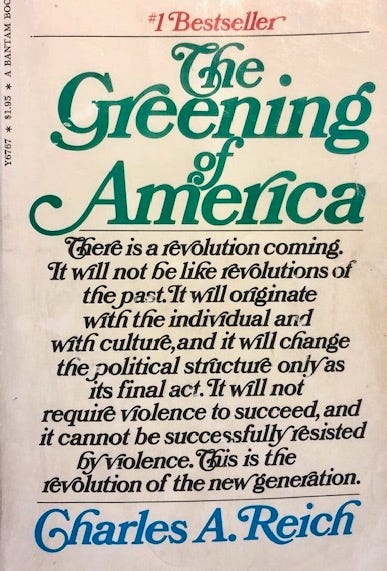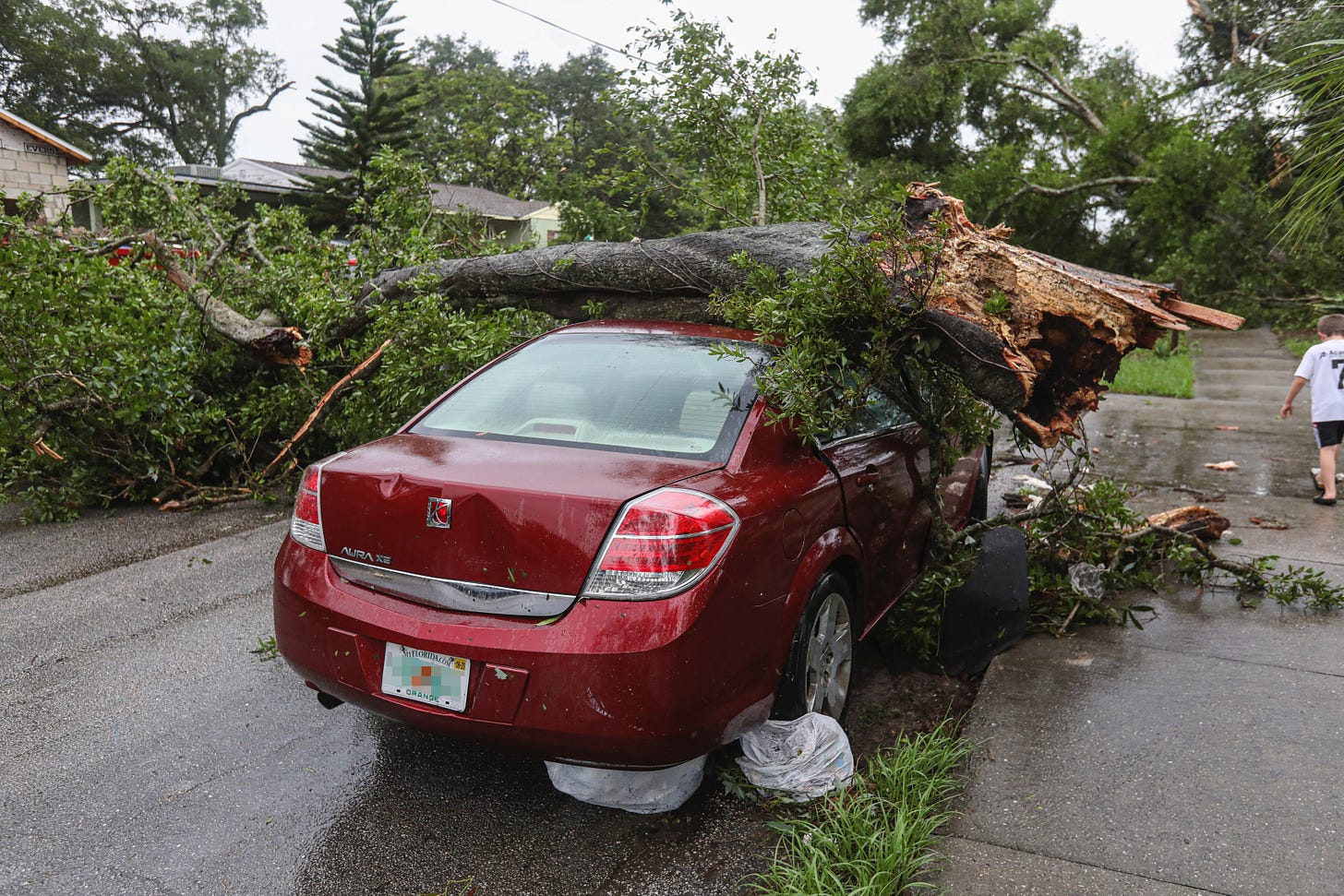The essence of the Corporate State is that it is relentlessly single-minded; it has only one value, the value of technology-organization-efficiency-growth-progress.
There is a revolution coming. It will not be like revolutions of the past. It will originate with the individual and with culture, and it will change the political structure only as its final act.
Charles Reich, 1970
***
In the 1960s and early 70s, many young Americans aspired to turn society on its head, much to the chagrin of the older generation. Charles Reich took a stab at explaining that counterculture movement in his best-selling book, The Greening of America.
Reich postulated that traditional values and opinions of Americans in the 19th and 20th centuries (self-reliant individualism; freedom to exploit seemingly unlimited resources; consumerism) would be replaced by a green, anti-establishment consciousness, one based on free thinking, collaboration instead of competition, community wellbeing, and social justice. The transformation would ultimately defeat the Corporate State which, in his words, “dominates, exploits, and ultimately destroys both Nature and man.”
As it turned out, however, the “greening” as Reich saw it, fizzled and fractured, and what’s left of it may be irrelevant. The Establishment has not only prevailed but has grown immensely in power.

The Great Reset
The world’s great economic and political centers, the U.S., U.K., and the European Union on the one hand, and China on the other, are now convinced that climate change presents a very serious threat to economic growth and the established global order. And they appear set to use every pro-growth device available to ensure a grand shift to non-fossil fuel energy in attempting to propel more economic growth (at substantial cost to the environment) and avoid the worse consequences of climate change. Corporate executives, social media giants, political leaders, government bureaucrats, military officials, scientists, and environmental organizations are, for the most part, on board. Let nothing stand in the way of “green growth.”
This astonishing fusion of power and influence across public and private sectors makes for a Corporate State that is vastly larger and more encompassing than in the day of Charles Reich’s Greening. It has spawned the Great Reset, a “new global operating system – an upgrade to the way modern capitalist economies are working.” The Reset began in earnest in response to the covid pandemic and has since engulfed climate and other global concerns.
Flies In The Ointment
The Great Reset, however, is facing fierce pushback from populist elements of both the political left and right. A stumbling economy and rising inequality in wealth distribution drives this anti-establishment sentiment. Recent price hikes for energy, food, and a full range of products has accelerated discontent. It’s understandable. Getting by has become a struggle for far more people than in the recent past. The impact is global and, by many accounts, worsening. More people can’t afford to feed their families. For others, prospects for getting their fair “slice of the pie” seem nil.
Governments cite inflation, supply chain disruptions, the war in Ukraine, and tightening energy supplies as the culprits. They promise relief through an iffy balancing of spending and austerity, and, above all, further economic growth.
But many people aren’t buying it. They see an economic system run by corrupt political and corporate elites that are far more in tune with their own self-interests than with the needs of the people. They’re increasingly fed up with a system that fails to deliver expected goods and services.
These populists, like those of the past, believe that ordinary people are to be trusted far more than governing elites. Generally speaking, they oppose globalization, corporate control over society, suppression of speech, the deep state, exorbitant military spending, interventionist foreign wars, and technologies that undermine the livelihoods and freedom of people. Those on the right oppose liberalized immigration and what they see as heavy-handed restrictions on using land and water resources. Those on the left condemn capitalism and social injustice. “Street” manifestations of today’s populism include the Yellow Vest uprising in France, the Canadian truckers' protest, and the Dutch farmers’ revolt (not to mention the now defunct Occupy Wall Street movement). In the U.S., social media personalities of rising populism include those with the Grayzone and the Jimmy Dore Show on the left, and Redacted on the right.
Populism surges as economic stress and depravation worsen. Rest assured that the Corporate State won’t stand by idly watching it get out of hand. Beyond its social and political dimensions, there are ecological reasons why opposition to the establishment will intensify.
Nature Strikes Back
The Corporate State, be it operating under the Great Reset or the label “green growth,” insists on economic expansion to remedy our economic woes. But that means greater exploitation of nature and natural resources, which means more pollution, ecosystem disruptions, and biodiversity loss, and risk of even greater greenhouse gas emissions at this critical juncture in the climate crisis. The end result of which is further economic and social havoc.
However, there is an ecological silver lining. The world has entered a negative feedback loop whereby further economic growth is stymied by climate change as well as by diminished human capacity to exploit nature without entirely trashing the planet. The covid pandemic, related to human impacts on (or meddling with) nature, was an abrupt blowback against civilization and its relentless war on the natural world.
Finally, there’s the reality of our combative human nature. More war means more environmental harm and economic instability. If there’s anything positive about the war in Ukraine, Europeans might ultimately decide to reduce energy consumption while switching more quickly to renewable energy (whether that actually happens remains to be seen).
Corporate State Intentions
The Corporate State’s answer to pushback from Nature is “green” industrialization. The multi-billion dollar funding bill just passed by the U.S. Congress reflects this strategy. The mission, as described by the Organisation for Economic Co-operation and Development, is (and I paraphrase) to open new markets by stimulating demand for green goods, services and technologies; create incentives for greater efficiency in the use of natural resources; mobilize revenues through green taxes and through the elimination of environmentally harmful subsidies; and reduce risks of negative shocks to growth due to resource bottlenecks, as well as damaging and potentially irreversible environmental impacts. This is pretty standard “sustainable development” blah with emphasis on a promised new wave of economic growth.
Populists insist that the Corporate State’s actual goal is full control of society. Reported measures to rein in public discontent and rebellion include control of thought and information though censorship, flooding the media with establishment narratives, crackdowns on public speech and peaceful assembly (related to covid restrictions), regulation of commercial speech, and direct product controls as, for example, the forthcoming ban on sale of new gasoline-powered cars in California.
Could it be that “eco-authoritarian” measures will increasingly be needed to subdue populist opposition to tightening environmental controls and regulations? Might it be possible that the Corporate State will eventually and intentionally slow the world economy for the sake of the climate? One environmental blogger, Nate Hagens, host of the Great Simplification, doesn’t think so. He believes that the world will just reach a point where growth stops, period, with unmentionable consequences. He’s in a crowd of company that expects civilization’s collapse (unless there is an abrupt and dramatic shift in global culture).
Conclusion
Back to my lead question: Can the Corporate State save the World? An educated guess is that it will struggle to avert the worst of climate change, at sacrifice to personal freedom. By insisting on “green” growth — and by ignoring degrowth, steady-state, and scale down alternatives — its actions will leave the natural world, and much of humanity within it, in utter ruin.
I’ve argued here on Substack and elsewhere that the climate crisis is just one part of a much broader and more deadly ecological crisis caused by overconsumption in developed countries, global overpopulation, and extreme anthropocentrism. These factors, driving us toward economic and ecological collapse, are worsened by Corporate State ambitions.
Is there any hope? Might a green counterculture, the kind that Charles Reich thought possible, emerge from today’s populism? I can’t imagine that. First, populists are averse to policies that intentionally or unwittingly reduce the flow of goods and energy to people. Those on the right generally want a return to the good old days of exploitation. Those on the left all but ignore multi-species injustice, focusing almost entirely on humanitarian social justice. Both disfavor grand-scale conservation for wildlife and nature as well as efforts to curb overpopulation.
Second, today’s environmental youth movement is narrowly focused on climate change and on demanding renewable energy, while often ignoring local ecological and social harms. The movement, with its most prominent figure, Greta Thunberg, is arguably now a convenient tool for authoritarian-leaning leaders of the Corporate State.
Third, the Corporate State excels at positioning opposition movements against one another, is skilled at pacifying people, and at fueling public apathy. Tim Dillion’s prophecy of doom is a comical but hardly improbable outcome.
Despite this dismal prognosis, there is, I believe, a spark of hope that lies with many millions of people the world over who love, care for, and care about the lives of animals, plants, and other living beings. Collectively, these “nature” people are a sleeping giant of potentially far greater influence on society. If only they’d come to realize it! Their awakening could, under wise and beneficent leadership, mount a life-affirming movement to replace, as its final act, the Corporate State.
Who might come forth to green America and the world; to lead, organize, and rally compassion and care for life as society’s grand imperative? Maybe that brilliant high school student who loves animals as well as people, and the rich CEO who’s disillusioned with the Corporate State, and your retired naturalist friend with time on her hands. And maybe the birdwatcher who moved next door, — and you?






This is an encouraging essay with lots of insights, so well worth reading. Thanks for your time thinking and writing so clearly.
I am ever hopeful, but then that seems rather stupid at times. Change often comes from a union of grassroots desire and activism prompting responses by the Corporate State. But then they can become authoritarian in dangerous ways. With the exception of the weapon-makers, many corporations are somewhat controlled by shifts in our demands, despite how much they market. We can all be more proactive as consumers, buying things that are relatively good for what we care about be it Nature, Humanitarianism, or both rolled into one. Eating organic and low on the food chain is easy for some people, but don't be tricked into fake meats that are full of processed oils that are actually unhealthy. You do have to be careful with what you buy because so much of the damage caused is hidden. Think sweat shops, and child slaves in the lithium mines, when you buy that surprisingly cheap new dress or feel smug about owning that flashy electric vehicle.
Another challenge that I find frustrating is that efforts to bring good may conflict. For example, maybe you do ecotourism to support biodiversity preservation, but then your flights have a huge carbon footprint that ramps up climate change. Obviously, we could all focus more conservation work locally and push for our governance structures to start paying us to do that. Unfortunately, so much of what is called "conservation" is actually killing animals for sport, creating forest monocultures, and sanitizing nature for our use.
I run volunteer projects in relatively poor biodiverse countries like Kenya and Ecuador, and charge comparatively wealthy Westerners a moderate fee to participate on the project. For example, what would you pay to camp with Maasai in Kenya for a couple of weeks? Would you value that unique cultural experience in nature? Would you enjoy walking around the savannah collecting data about giraffe nurseries and their habitat needs, or do you only want to go on safari drives and stay in fancy lodges? My wealth transfer frameworks help to protect wildlife and ecosystems in biodiversity hotspots, empower local people to advocate and act on nature conservation, and broaden the personal horizons of all involved.
I would guess many of your readers are doing what they can to slow the now global Corporate State as it eats through Nature and people to enrich an elite class. The easiest way to stop them is to refuse to support their wars and their products - but that's a tough act for most.
I remain hopeful that we will find that balance between caring for the environment and caring for the Earth's peoples, too. In fact, doing BOTH is the secret of success. This is why I founded a Facebook group inspired by Pope Francis's Laudato Si' (look for our banner, the planet Earth on a leaf, where one of our followers shared this article), which has grown from a few friends to over 900 individuals and organizations (Catholic and many other traditions). The Laudato Si' in turn was inspired by the words and works of St. Francis of Assisi and by the #creationcare focus of the Greek Orthodox church movement. We also coordinate with a group in Israel, authors of the Eco Bible, the Interfaith Center for Sustainable Development. On the secular side, I have worked directly with the author of Blood and Earth, Kevin Bales, an expert on human slavery who sees that saving our peoples and saving our environment go hand-in-hand. I also am a founding member of the Zonta District 12 (Colorado, Montana, South Dakota, Wyoming) AEGE (Action for Environment and Gender Equality) committee which is concerned with environment issues in our region and also with elevating women's concerns and voices, including the voices of our Indigenous peoples. (See our work at the Zonta Says NOW - District 12 page. The Zonta Says NOW movement was founded by fellow Zontians in Australia District 23.) Through all of these associations and others I see hope and action every day!